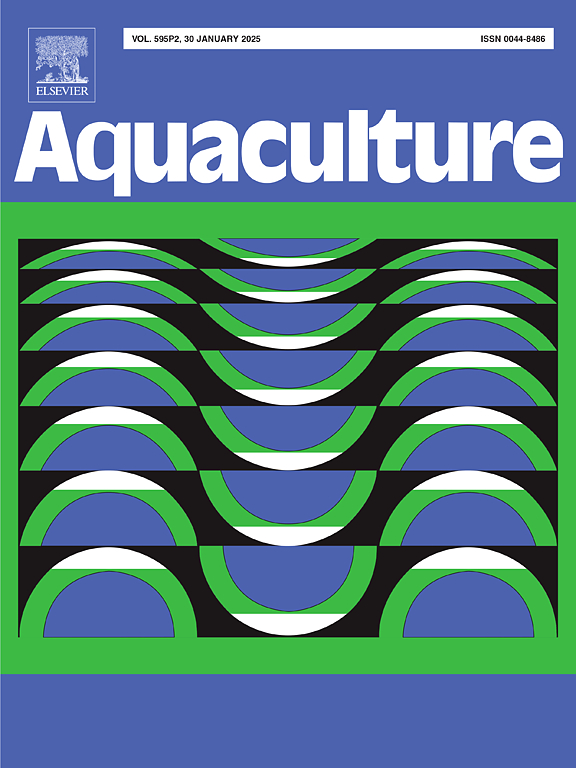比较茴香粉和茴香提取物纳米颗粒对尼罗罗非鱼生长、免疫和组织病理变化的调节作用
IF 3.9
1区 农林科学
Q1 FISHERIES
引用次数: 0
摘要
本试验旨在评价茴香粉(FP)和茴香纳米提取物(FNPs)对提高生长性能和抗氧化能力的影响。免疫系统抵御恶臭杆菌感染的能力也被检测。尼罗罗非鱼(n = 225尾,27.15±0.12 g)随机分为5个等分组,每组45尾,每个重复15尾。第一组(对照组)饲喂不添加任何饲料添加剂的饲粮,第二组(FP 0.5)和第三组(FP 1)分别饲喂添加0.5%和1%茴香粉(FP)的饲粮。第4组(FNPs 0.5)和第5组(FNPs 1)分别饲喂添加0.5%和1% (FNPs)的基础饲粮。饲喂试验结束时;每组15尾鱼经腹腔(I/P)接种恶臭单胞菌。对患病鱼进行了14天的监测,记录了死亡率、行为改变和临床症状。结果显示,与对照组相比,FP和/或FNPs富集组的所有生长指标均有显著改善。FNPs 1组溶菌酶(32.07 μmol/ mL)、NO (47.67 μmol/L)和IgM (40.26 μmol/ mL)的免疫应答指标均较对照组(分别为16.37、34.88和26.28)有显著提高。此外,FNPs 1组肝脏氧化应激生物标志物CAT (22.93 U/G)、SOD (9.17 U/G)和GSH (2.92 mmol/ G)的活性也有显著改善。恶臭假单胞菌攻毒后,FNPs 1的存活率最高(88.66%),其次是FNPs 0.5(73.33%),最后是FN1(66.66%)。结果表明,高浓度的FNPs可以作为一种有前景的饲料添加剂,促进尼罗罗非鱼的生长和免疫反应,并保护尼罗罗非鱼免受恶臭杆菌感染。本文章由计算机程序翻译,如有差异,请以英文原文为准。
Comparing the modulatory effect of fennel powder and fennel extract nanoparticles on growth, immunity and histopathological changes of Nile tilapia
A sixty-day feeding trial was performed to assess the impact of fennel powder (“FP) and fennel extracts nanoparticles (FNPs) in enhancing the growth performance, antioxidant capacity. The immune system's ability to fend against P. putida infection was also assayed. Nile tilapia (n = 225, 27.15 ± 0.12 g) were segregated into five equal groups in triplicates (45 fish/ group, 15 fish/ replicate). The initial (control) group received diet devoid of any feed supplements, whereas the second (FP 0.5) and third (FP 1) ones received diet enriched with 0.5 % and 1 % fennel powder (FP) respectively. The fourth (FNPs 0.5) and the fifth (FNPs 1) groups received a basal diet enriched with 0.5 % and 1 % (FNPs) respectively. At the end of feeding trial; fifteen fish from each group, were intraperitoneally (I/P) inoculated with P. putida. The challenged fish were monitored for fourteen days, where mortalities, behavioral modification and clinical signs were documented. Results depicted that, FP and/or FNPs- enriched groups showed a substantial improvement in all growth indices compared to the control group. The immunological response biomarkers involving lysozyme (32.07 μg/mL), NO (47.67 μmol/L), and IgM (40.26 μg/mL) were uniquely improved in the FNPs 1 group when compared to their values in the control group(16.37, 34.88, and 26.28, respectively). In addition, FNPs 1group also displayed major improvement in the activity of hepatic oxidative stress biomarkers: CAT (22.93 U/G), SOD (9.17 U/g), and GSH (2.92 mmol/g). Following the challenge with P. putida, the highest survivability percentage was noted in FNPs 1 (88.66 %), followed by FNPs 0.5 (73.33 %), and then, FN1 (66.66 %). Eventually, it could be concluded that FNPs, particularly, with higher concentrations could be used as a promising dietary supplement to enhance growth and immunological response as well as to safeguard Nile tilapia against P. putida infection.
求助全文
通过发布文献求助,成功后即可免费获取论文全文。
去求助
来源期刊

Aquaculture
农林科学-海洋与淡水生物学
CiteScore
8.60
自引率
17.80%
发文量
1246
审稿时长
56 days
期刊介绍:
Aquaculture is an international journal for the exploration, improvement and management of all freshwater and marine food resources. It publishes novel and innovative research of world-wide interest on farming of aquatic organisms, which includes finfish, mollusks, crustaceans and aquatic plants for human consumption. Research on ornamentals is not a focus of the Journal. Aquaculture only publishes papers with a clear relevance to improving aquaculture practices or a potential application.
 求助内容:
求助内容: 应助结果提醒方式:
应助结果提醒方式:


